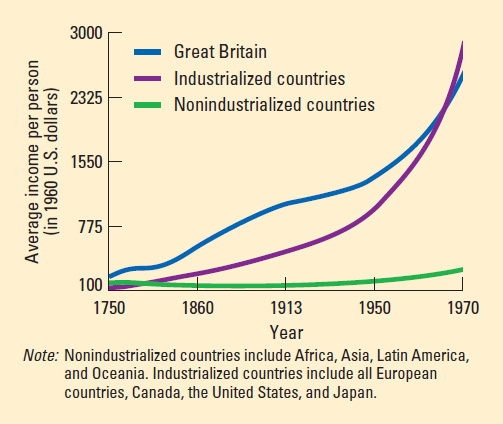A History of Western Society: Printed Page 790
A History of Western Society, Value Edition: Printed Page 797
The Rise of Global Inequality
The Industrial Revolution in Europe marked a momentous turning point in human history. Those regions of the world that industrialized in the nineteenth century (mainly Europe and North America) increased their wealth and power enormously in comparison to those that did not. A gap between the core industrializing regions and the soon-to-be colonized or semi-colonized regions outside the European–North American core (mainly in Africa, Asia, the Middle East, and Latin America) emerged and widened throughout the nineteenth century. Moreover, this pattern of uneven global development became institutionalized, or built into the structure of the world economy. Thus a “lopsided world” evolved, a world with a rich north and a poor south.

In recent years historical economists have charted the long-term evolution of this gap, and Figure 24.1 summarizes the findings of one important study. Three main points stand out. First, in 1750 the average standard of living was no higher in Europe as a whole than in the rest of the world. Second, it was industrialization that opened the gaps in average wealth and well-being among countries and regions. Third, income per person stagnated in the colonized world before 1913, in striking contrast to the industrializing regions. Only after 1945, in the era of decolonization and political independence, did former colonies make real economic progress, beginning in their turn the critical process of industrialization.
The rise of these enormous income disparities, which indicate similar and striking disparities in food and clothing, health and education, and life expectancy and general material well-being, has generated a great deal of debate. One school of interpretation stresses that the West used science, technology, capitalist organization, and even its rational worldview to create massive wealth, and then used that wealth and power to its advantage. Another school argues that the West used its political and economic power to steal much of the world’s riches, continuing in the nineteenth and twentieth centuries the rapacious colonialism born of the era of expansion. Because these issues are complex and there are few simple answers, it is helpful to consider them in the context of world trade in the nineteenth century.